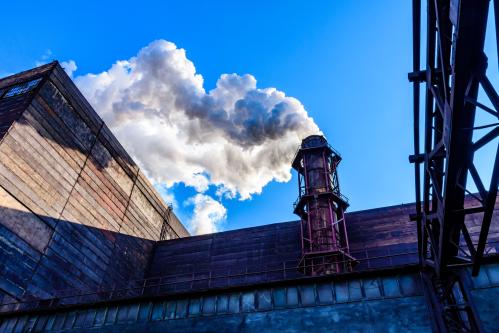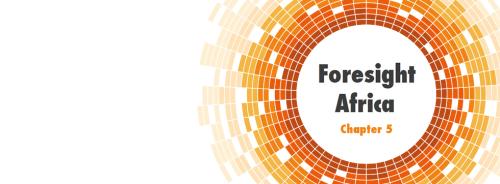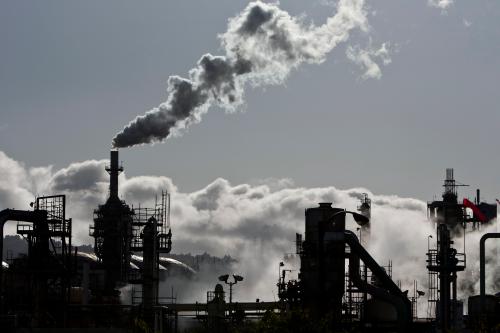Bangladesh has surprised the world by being at the forefront of several development movements. It now has the opportunity to lead again, this time on carbon tax.
The country has already led the microfinance movement, improved social indicators such as life expectancy through the development of a highly pluralistic health system environment, and is currently at the head of a mini “solar revolution.” When Bangladesh published its Climate Change Strategy and Action Plan in 2009, it was the first developing country to articulate such a coordinated action plan. It was also the first country to set up its own Climate Change Trust Fund to mitigate and adapt to climate change. In 2011, the Bangladesh Constitution was amended to protect the environment and safeguard natural resources for current and future generations. The Prime Minister Sheikh Hasina was one of the 2015 “Champions of the Earth” winners, a United Nations’ honor recognizing leadership and actions on sustainable development and climate change.
While carbon taxes have mainly been introduced in developed countries, an increasing number of emerging markets are realizing their benefits as well, including Chile, China, Kazakhstan, Mexico, and South Africa. Bangladesh would be the poorest country to implement a carbon tax. This would place the country at the forefront of efforts to address climate change, and, at the same time, it would reap many benefits.
Taxing bads instead of goods: A carbon tax can be part of a range of policies that help Bangladesh refocus its taxes away from “goods” and toward “bads.” Bangladesh has fairly high tax rates compared with some other countries in South and Southeast Asia. For example, corporate tax rates are between 25 and 45 percent, higher than in Indonesia, Thailand, Malaysia, or Vietnam. Labor taxes are higher than in Sri Lanka and Pakistan. Introducing a carbon tax could help rebalance the tax system away from workers and firms and toward the payment of taxes on things that cause harm. To maximize the positive impact of this shift, it will be important to ensure that fuels are not priced below world prices, as has been the case in the past and is still the case for some sectors that receive privileged pricing.
Revenue neutrality: Initially, a carbon tax can be revenue neutral. Fuel prices in Bangladesh are currently above world market prices. By linking prices to world prices and making explicit a carbon tax, overall price changes need not burden consumers. However, fuels that pollute more would see a small price increase and less polluting fuels would see a small price decrease. Over time, the carbon tax could rise according to a pre-announced schedule, helping to raise much-needed fiscal revenue, while fuel prices would need to adjust with global prices. Since wealthier households tend to consume more fuel than poorer ones, carbon taxes can be progressive. However, it will be important to take steps to moderate the impact on poorer households as taxes increase.
Administrative simplicity: Carbon taxes can be simple to implement. They can be collected using the same administrative systems as existing taxes, or with only small modifications. In addition, when levied “upstream,” such as on fuel wholesalers (importers and producers), carbon taxes need only be collected from relatively few firms. Wholesalers then pass the tax on to retailers, who pass it on to consumers. This “keep-it-simple” approach is strongly recommended by the experience of other countries. In addition, a carbon tax does not need to cover all carbon emissions. It could focus on fuel, since it can be difficult to collect carbon taxes from other sources, such as landfills or forestry.
Mitigating climate change: Bangladesh is one of the countries hit hardest by climate change. A 2014 estimate placed annual losses from climate change at 2 percent of GDP by 2050. Signs of Bangladesh’s vulnerability can already be seen and the human, financial, and infrastructure costs will only mount as the impacts intensify. Even though Bangladesh’s contribution to climate change is minimal—less than half a percentage point of global emissions—the country would be a leader toward global abatement. Carbon taxes—and “green taxes” more generally—can contribute meaningfully and are an important signal to the international community that Bangladesh is willing to play a part in global mitigation. In addition to giving the country greater weight in international climate discussions, a carbon tax can help Bangladesh meet its commitments during the COP21 in Paris in 2015 to reducing climate-harming emissions by 5 percent by 2030, and more if sufficient financial and technological resources are made available.
A carbon tax could help Bangladeshi exporters get “ahead of the curve” as consumers (and laws) in developed markets become more environmentally conscious in their sourcing of imports. However, policymakers could justifiably be concerned about the impacts of carbon taxes on the poorer population and on some economic sectors. It will be important to consider these challenges as Bangladesh pulls itself, again, into the vanguard of environmental, tax, and development movements.
* The authors are, respectively, World Bank Senior Economist, World Bank Country Director for Bangladesh, and World Bank Lead Economist
The Brookings Institution is committed to quality, independence, and impact.
We are supported by a diverse array of funders. In line with our values and policies, each Brookings publication represents the sole views of its author(s).









Commentary
Carbon taxes: An opportunity for Bangladesh?
November 22, 2016